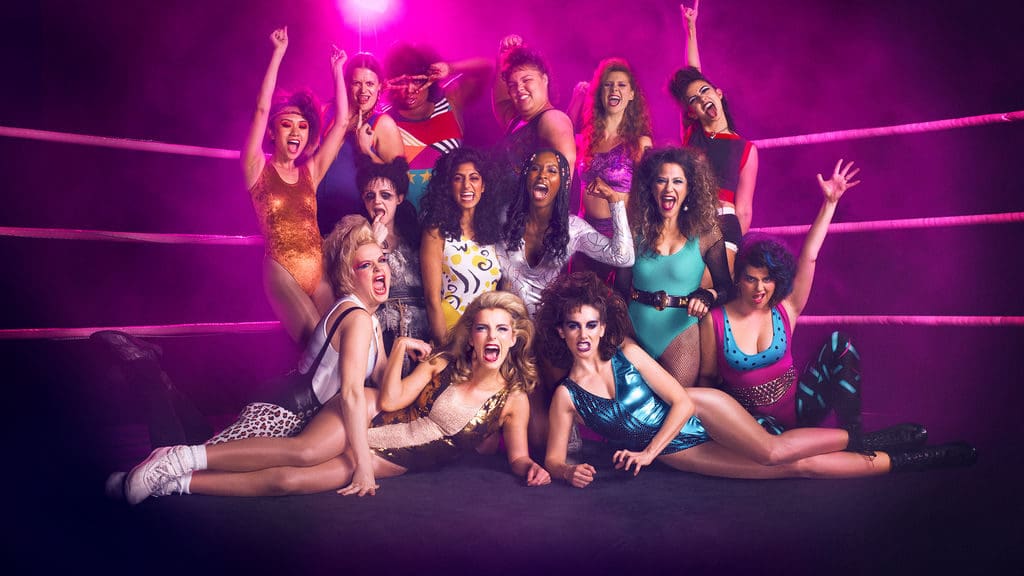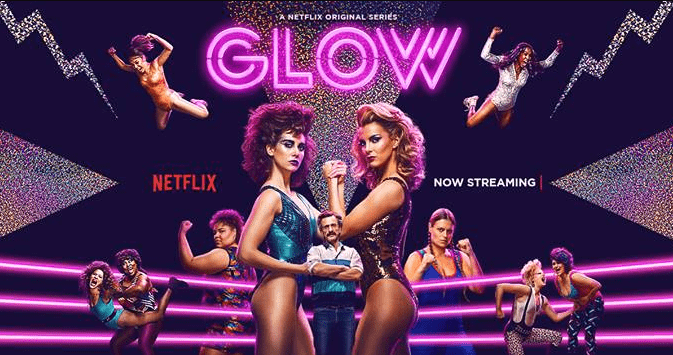Written by Melissa Jouben
Glow is a show about wrestling. It is also a show about women. It is a show about women who wrestle. It manages to be distinctly all three of these things at the same time, and it never falls short in any category.
Through the ten-episode first season, we get to see accurate and real representations of women and their relationships, while also getting treated to some exciting albeit mostly amateur wrestling along the way. When I wrote my review of the first episode, I wondered whether we would get to see the women of GLOW in their full glory or if we’d only ever get to see the pro wrestling in small teases.
What I failed to realize was that watching these women learn to wrestle and come together as a team WAS seeing them in their full glory.
If anyone needs a quick recap of the show’s premise, let me help you: GLOW focuses on Ruth Wilder (Alison Brie), a needy, desperate, self-conscious actress who is on her last leg when she hears about a casting call for a new all-women wrestling show, directed by the bitter, sorta sexist, Sam Sylvia (Marc Maron). She also happens to have slept with her best friend Debbie (Betty Gilpin)’s husband. After being confronted by Debbie during a wrestling practice, Debbie’s pure fury and desire to kick Ruth’s ass gets her cast as the show’s lead. While the assembled team of misfits learn how to wrestle and work together, Ruth is determined to win them all over and earn Debbie’s forgiveness. This is a bit of an oversimplification, but it works to establish the groundwork.
Most of the themes in GLOW revolve around some pretty familiar concepts that become elevated due to their self-referential nature here. Character development should unfold throughout the plot of any series, but here it carries multiple layers of meaning thanks to the making-of-a-show-within-a-show storytelling. GLOW is quite literally about character development, as evidenced through Ruth’s struggles to find her place in the group and nurture a wrestling gimmick that is as clearly defined as those of her peers. Ruth can’t help but notice the parallels between her issues in the ring and her issues with herself.
She notices that some of the other girls are adopting gimmicks that are based on their own personalities – Sheila “The She Wolf” (Gayle Rankin), for example, is a woman who dresses in the same dirty furs and feels, spiritually, like a wolf. Her “She Wolf” persona is only an amplification of her own personality to suit the needs of an over-the-top character. For Ruth, a personality was only ever a projection of whatever it is she thought people wanted to see from her; in order to amplify her personality, she would need to have a personality to begin with.
Lucky for her, it turns out there IS one buried deep down beneath all her insecurities. Fearing that she is letting her teammates down, she works herself hard to rise to the occasion and in doing so, she begins to act selflessly. The REAL Ruth doesn’t find her power in standing out – she finds it in lifting everyone else up. It may be a long road for her to reach that realization – and she’s still got work to do after getting there – but it’s an important and often times moving journey for her that you can’t help but empathize with. But rest-assured that although Ruth may walk out of the ring in episode ten a better person, the secondhand embarrassment you’ll feel along the way is never in short supply.
My favorite theme in GLOW was one that would surely win over any wrestling fan, and makes you appreciate how well the show married their storytelling with the world of professional wrestling: The heel-face dichotomy. A “face” in wrestling terminology is the hero, the good guy – usually paired against a “heel,” their villainous foil. It was an absolute joy to watch the way the show weaved this concept into the very explicit wrestling narratives the girls were struggling to form, as well as watching it take on a second meaning through their relationships with each other. One second Ruth is the real-life heel to Debbie’s face, and the next you’re wondering who it is you’re really rooting for. When Ruth is told that she’s going to be the heel, she’s downright distraught over the possibility of her deepest insecurities and fears being realized on a national stage. What she doesn’t count on, however, is how much power there is in being the villain and in controlling your own narrative.
Wrestling fans can (and do) turn on faces all the time, but a well-crafted heel could have the audience eating out of the palm of their hand. Learning to harness that control is pretty much all Ruth has going for her at this point, and she clings to it with her trademark desperation, but in a way that yields positive results. Take for example her relationship with Debbie. Determined to succeed, she stays well out of Debbie’s way, offers to help her train so that Debbie can outshine her in the ring, and generally beats herself up over her mistakes whenever she gets the moment. The character introduced to us as a bit of a heel is only striving to make amends with the face, who can’t let Ruth’s indiscretions go. At first you feel for Debbie; her life quickly falls to pieces in the aftermath of her husband’s infidelity, but her inability to leave her personal problems at the door means that her performance and her temperament both start to suffer.
Plus, it does her no favors that she’s actively held back by the fact she thinks wrestling is stupid. You can argue up to a certain point that Ruth may have ruined Debbie’s life with her selfish actions, but at the end you’re left thinking that she may have actually made both their lives better by bringing Debbie into this world with her, giving her the opportunity to reclaim her body from her husband or her baby, as well as reclaim her life and give her more to look forward to than just the life of a housewife.
It almost feels like a disservice to get this far into discussing the show without giving the rest of the ensemble cast their due credit. There are so many smaller storylines here that are just as poignant and impactful, starting with Carmen (Britney Young), who I had hoped in my review of episode one we would see more of. Young is billed as a main actress in the series, and I don’t doubt that if we see a second season (and I don’t doubt that we will) that Carmen will be featured even more prominently. Her storyline revolves around being the only woman in a wrestling dynasty, and as such, being banned from wrestling by her over-protective father. Carmen struggles throughout the season with striking out on her own to follow her dreams, and then with overcoming her stage fright. If you’re anything like me and get overly emotional watching television, I can’t imagine the conclusion of her season-long arch will leave you dry-eyed.

Tammé “The Welfare Queen” Dawson (Kia Stevens, a real-life professional wrestler known most commonly by the ring names Awesome Kong or Kharma) grapples with the way she fears the audience will react to the stereotype of an unemployed black woman using up government resources, a commentary on Reagan-era conservativism that she fears won’t land the way Sam thinks it will. It’s a really delicate (and somehow, timely) dilemma, one that the show gives us a pretty satisfying payoff for later on. Cherry “Junkchain” Bang (Sydelle Noel) is the only member of the group with previous experience working with Maron’s Sam Sylvia, and her struggle to win the respect of her peers and properly train them is just the first of many issues you’ll watch Cherry overcome through the season.
One of the most important elements of the show is undoubtedly the relationship that forms between Ruth and Sam, and Sam in general. At the beginning the two are contentious and Sam can barely tolerate her. However, his actions and some of his dialogue towards her (“maybe I don’t like your face, or maybe I like it too much”) imply that whatever his issues are with Ruth, they aren’t entirely about her. The more you watch them interact, the clearer it becomes that the two are like opposite sides of the same coin. Both are emotionally needy and insecure, only his deep-seated issues manifest in different ways.
While Ruth may have been terrified to be seen as a heel, Sam leans into a heel angle for himself because he knows the power in controlling peoples’ perceptions of him. He becomes, all at once: Ruth’s paternal figure, a mentor who helps guide her in areas she never knew she would need guidance on, her biggest opposition, and her closest friend. Possibly also a future love interest, but you have to imagine their relationship would be fraught with all their combined emotional baggage if that turns out to be the case. Although Marc Maron is essentially just playing Marc Maron here, it’s still worth noting that his performance does everything right – and wrong, when it’s supposed to – and is one of the highlights of a show where everyone’s performances are as bright as neon.
And of course, where would GLOW be without the wrestling? There’s some really impressive wrestling, and a lot of people enjoying wrestling, but most importantly, we get to watch people learn how to wrestle. I never thought I needed that, but I absolutely did. And although the women of GLOW never learn how to do moves that are all that complicated (with the exception of Debbie who executes a move that is visually thrilling and so, so satisfying to watch after ten episodes of nobody coming close to that level of showmanship) it is still way more fun than I anticipated to watch them learn and watch them practice bodyslamming each other.
To prove how serious the creative team behind GLOW was about making sure to get the wrestling right, they hired Chavo Guerrero Jr. – nephew of Mando Guerrero, the trainer for the real Gorgeous Ladies of Wrestling – to train the actresses. The cameos are plentiful, too; an unexpectedly fun one to look out for is Brooke Hogan.
For a show that is SO many things – a comedy, a drama, a semi-biographical story, a show about wrestling, a show about women – GLOW succeeds by leaps and bounds on all fronts yet somehow still manages to be greater than the sum of its parts. If you’re a fan of any of the aforementioned things, I can’t see how this show would disappoint you.
Series Rating: 10 out of 10
https://www.youtube.com/watch?v=AZqDO6cTYVY&t=15s


